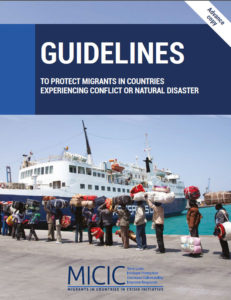New international guidelines to protect vulnerable migrants
New guidelines that provide a framework for the protection of refugees and migrants in the event of conflict or natural disaster were launched this week by the international Migrants in Countries in Crisis (MICIC) Initiative.
‘Guidelines to Protect Migrants in Countries Experiencing Conflict or Natural Disaster’ is a document that clear identifies what national states, international organizations and others should do to better protect migrants in crises.
 The MICIC Initiative is co-chaired by the Philippines and the United States, and supported by a Working Group comprised of Australia, Bangladesh, Costa Rica, Ethiopia, the European Commission, IOM, UNHCR, ICMPD, Georgetown University’s Institute for the Study of International Migration, and the Office of the Special Representative of the UN Secretary General for International Migration.
The MICIC Initiative is co-chaired by the Philippines and the United States, and supported by a Working Group comprised of Australia, Bangladesh, Costa Rica, Ethiopia, the European Commission, IOM, UNHCR, ICMPD, Georgetown University’s Institute for the Study of International Migration, and the Office of the Special Representative of the UN Secretary General for International Migration.
Almost all countries host a migrant population and no country is immune to conflict or natural disaster and migrants were among those worst affected in every humanitarian crisis of the last decade, according to recent UN data.
The European Commission funded the convening of six regional MICIC Initiative consultations, preceded by regional consultations organized by civil society groups. The governments of Australia and the United States funded consultations with international organizations, civil society and the private sector, and with members of the Intergovernmental Consultations on Migration, Asylum and Refugees and other States.
The MICIC Initiative Secretariat commissioned issue briefs, held webinars, circulated a regular newsletter and created an interactive web portal to broaden and deepen the engagement and understanding of the relevant issues.
That process culminated in this week’s publication of the MICIC Initiative Guidelines, which outline concrete and practical advice on what all actors can do to save lives, increase protection, decrease vulnerability and improve responses.
They include advice on how to prepare for addressing the needs of migrants during crises, how to respond to crises in ways that protect migrants and how to help migrants and communities recover from crises.
“We have a collective responsibility to improve protection for vulnerable migrants in countries experiencing crisis,” said migration expert Professor Ian Pringle, of Georgetown University.
“International organisations, nation states, employers, volunteer community groups and civil society all have a role to play in ensuring that migrants and refugees and their particular needs and vulnerabilities are taken into account in preparing for, responding to and recovering from crisis,” he said.
Director of the MICIC Initiative Secretariat Michele Klein-Solomon said that despite being resilient and resourceful in the face of crises, during emergency responses, migrants “often fall between the cracks”.
The Guidelines can be seen on the MICIC Initiative website: http://micicinitiative.iom.int/
Laurie Nowell
AMES Australia Senior Journalist












